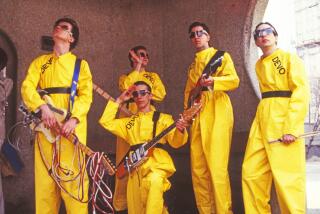On Film, These Kids Were All Right Some of the Time
- Share via
The Who marked its territory in rock right away in the now-classic line from “My Generation”--”Hope I die before I get old.”
Although drummer Keith Moon’s death in 1978 at 31 may have seemed like a grim fulfillment of that sentiment, premature demise was not the lasting legacy of a band that helped expand the scope of rock as if it were its own Manifest Destiny.
For the record:
12:00 a.m. May 2, 2001 For the Record
Los Angeles Times Wednesday May 2, 2001 Home Edition Calendar Part F Page 2 Entertainment Desk 1 inches; 28 words Type of Material: Correction
Keith Moon death--A story published in Friday’s Calendar about the Who cited the wrong drug as the cause of drummer Keith Moon’s death in 1978. Moon overdosed on the prescription sedative Heminevrin.
Not only did singer-songwriter-guitarist Pete Townshend lead the band in producing probably the most successful rock opera ever, “Tommy,” he also shepherded the band’s venture into the movies on several fronts in the 1970s. At one point it started to seem like the fabled quartet’s new mantra could be “Hope I die before I get less than one point of any green-lighted project’s net box office, plus residuals.”
Three recently remastered soundtracks from Who-related films provide a look at the band’s up-and-down exploits for the silver screen.
** 1/2 “Tommy,” Original Soundtrack, Polydor. Director Ken Russell turned the Who’s genre-defining rock opera into one perversely fascinating mess of a movie. It was far from the ideal translation Who fans might have envisioned, but it did include several high-profile guest turns--some brilliant, some preposterous--by the likes of Elton John, Tina Turner, Ann-Margret, Oliver Reed and Eric Clapton, along with Who lead singer Roger Daltrey in the title role.
The single great move was the casting of Turner as the Acid Queen, and she invested as much grit and lasciviousness into that character as the Who ever could have imagined. Elton’s take on “Pinball Wizard” also was a distinctively worthwhile variation on the Who’s own.
But too much of “Tommy’s” music became overblown in Townshend’s efforts to make it sound bigger and better on film. That may have been exactly what Russell’s directorial vision called for, but the result was a bombastic tone that often pushed the rock opera’s Christ parable into the realm of self-parody. Today it survives as a rock curiosity, not by any means as a replacement for the Who’s landmark 1969 recording.
*** “Quadrophenia,” Original Soundtrack, Polydor. This 1979 soundtrack works a lot better than the one for “Tommy” because the band and director Franc Roddam went with the studio versions of about half the songs from the 1973 “Quadrophenia” double album (although bassist John Entwistle remixed them for the movie and even rerecorded some of his bass parts).
In addition, there are two tracks from the High Numbers, the group that turned into the Who. The rest of the 23-track single disc consists of early-’60s cuts from James Brown, the Kingsmen, Booker T & the MG’s and others that serve as a musical backdrop for the story in Townshend’s second rock opera about the conflict between British Mods and Rockers in that era.
There’s a stylistic schism between the Who material, reflecting as it did the rock grandeur of the band circa 1973, and the decade-older, pre-British Invasion pop hits. The result is far less thematically cohesive than the original album, but it’s hard to argue with the ‘60s tracks selected or with the best-of-”Quadrophenia” mini-set.
*** 1/2 “The Kids Are Alright,” The Who, MCA. This wide-ranging recording for a 1979 documentary makes for an excellent single-disc overview of the quartet’s career from its early days as yet another British Invasion contender through the late-’70s when it reigned as one of the titans of arena rock. The majority of the performances are live, drawn from various TV and concert appearances, starting with a mighty 1967 version of “My Generation” done on “The Smothers Brothers Comedy Hour” and including a long “Tommy” set from Woodstock.
The band’s nervous energy and anarchic spirit in such early numbers as “My Generation” and “I Can’t Explain” morph into the explosive questioning of authority that suffused the “Tommy” and “Who’s Next” albums. The disc closes with a towering performance of “Won’t Get Fooled Again” recorded just four months before Keith Moon died from a heroin overdose.
*
Albums are rated on a scale of one star (poor), two (fair), three (good) and four (excellent).
More to Read
The biggest entertainment stories
Get our big stories about Hollywood, film, television, music, arts, culture and more right in your inbox as soon as they publish.
You may occasionally receive promotional content from the Los Angeles Times.








